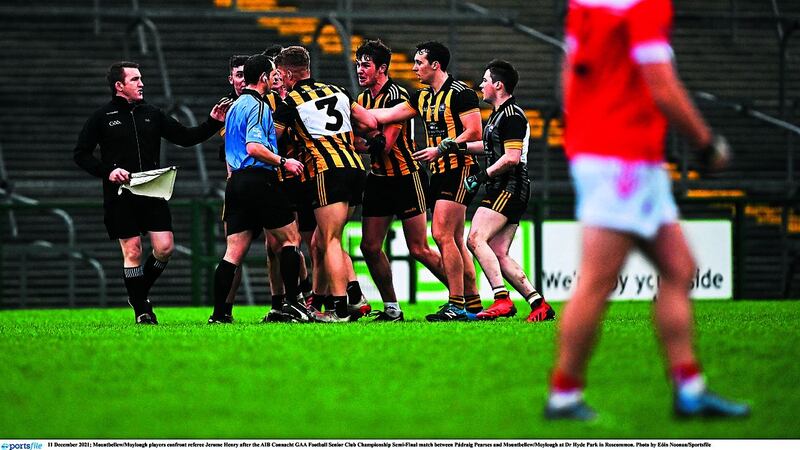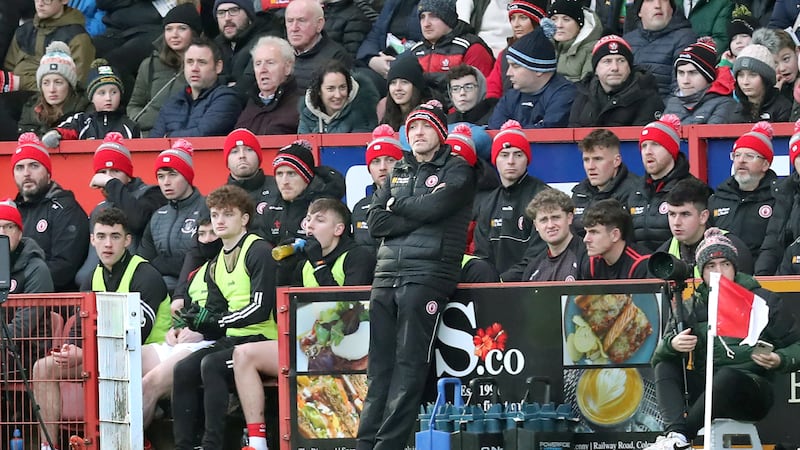WHICH is the bigger problem then: refereeing, or the diving culture that has contributed to the difficulty of their work?
It has been a bad weekend for the men in black.
Jerome Henry and Johnny Murphy are both experienced, established inter-county referees who have found themselves in the eye of the storm.
The reasons they ended up there were very different but it all adds up the same.
Galway football champions Mountbellew-Moylough had last month beaten the all-conquering Corofin to finally win a county title they’ve craved and been so close to for so long.
Level with Padraig Pearses three minutes into injury-time of Saturday’s Connacht semi-final, Barry McHugh took a clear mark just outside the 21’.
Jerome Henry didn’t award the mark, for whatever reason. The only rationale I could think of is that he lost the ball for a second and wasn’t sure if McHugh had spilled and regathered it.
If that was the case, a linesman or umpire had to be shouting in his ear. It’s all on the ref himself but it shouldn’t be.
The ball was turned over, Padraig Pearses went down the field and kicked the winner instead.
When it was over, McHugh was among the Mountbellew-Moylough players to run straight to the referee on the final whistle. Some were seen to push and jostle him.
Now, there’s no defending that. You just can’t do it.
But I don’t think I’m wrong for having greater sympathy for the players than the referee in this case.
That might be a deeply unpopular sentiment but hear me out.
Mountbellew-Moylough had waited years to get out of Galway. The three-in-a-row All-Ireland champions are gone. Connacht, and the All-Ireland, are sitting there for somebody.
To not award the mark was an unforgivable decision.
Some people will feel that’s too harsh a description. And therein lies the problem.
It feels as if you’re not allowed to criticise a referee any more, no matter what they do.
Referees are hard to recruit and harder to retain.
But walking on eggshells when it comes to the big decisions is a very precarious form of encouragement.
I have great sympathy for Jerome Henry, to a point. It’s not easy. The mark isn’t overly complicated in itself, but it makes the game more complicated to referee. There’s no call for the rule to exist and it should be done away with, but that’s another debate.
It will have been a difficult weekend for him.
But it was a simple call. Mountbellew-Moylough might never get another shot at a Connacht title. Any player who’s been on the receiving end of a call like that will tell you how incredibly hard it is to hold your counsel.
If you lose the head, you end up in serious bother. But if you keep your cool, what happens? Who is held responsible for the mistake that just cost you your dream?
A lack of accountability contributes greatly to the frustration people feel towards referees.
It’s the idea that they’re in short supply so we have to protect them at all costs, so let’s not talk about how bad the decisions that they make are.
Making mistakes is never the problem in any walk of life.
The problem is not learning from them.
Now, there’s a two-fold thing here. Refereeing has always been difficult but it’s become increasingly so in recent years. You can look to the introduction of new rules and lay some of the blame there.
But another culture has taken grip of the GAA and is just as damaging as poor refereeing.
We seriously need to talk about the diving and trying to get men sent off that’s going on.
It wasn’t pulled out from the root when it started, and now the whole place is covered in it.
You have to whisper it though. It’s alright to cut referees in bits for bad decisions but you daren’t criticise players for throwing themselves down as if they’d just been acquainted with Lee Harvey Oswald.
When Noel McGrath hit Paddy Leavy dunt into the chest with his shoulder, the Ballygunner midfielder threw himself screaming to the floor.
McGrath was sent off by Johnny Murphy, while Leavy bounced up and played on.
That just happened to be the weekend’s example. But at some point now in almost every game you watch, you’ll see a player pretending to be hurt.
Some of it is try and get opponents sent off.
A lot of it is towards the end of games, killing time or momentum. It’s so obvious but we allow it to happen.
The lack of accountability for such actions has created a culture of acceptance, which is just wrong.
There has to be a duty of care to players but referees should be given more leeway to make a judgement call on when men are swinging the lead.
The game shouldn’t be stopped for anything other than an injury that looks serious.
A natural fear of head injuries is understandable but sadly, it’s been taken advantage of.
Team caught on the counter? Go down and hold your head.
Opposition scored three in a row? Go down and hold your head.
Defending a one-point lead with two to go? Go down and hold your head.
There has to be more freedom given to physios to come on and treat players and allow the game to continue around them.
It’s like the row before the throw-in - the best way to sort it out is throw the ball in.
They soon forget about the wrestling, and they’d soon forget about the lying down if it was to come at a cost.
It’s serious now, all the diving and rolling about. There’s nothing worse to look at.
It should be called out every bit as much as a bad refereeing decision.
No problem ever got fixed by pretending it didn’t happen.
Where there is no accountability, there will be no responsibility.
Referees will continue to make mistakes but the question is: what are we going to do about it?
How are we going to try and minimise them?
Do we need to pay referees more? Recruit them younger? Have a greater level of training and education? Silent sidelines at all underage games? Have a strict policy of only the team captain speaking?
The like of that is grand when you have competent referees with an attitude that lends itself.
We all know loads of referees who are really good people. This is not a tarring and feathering of the entire clan.
But when, for instance, you meet the occasional arrogant whistler who doesn’t have the courtesy to speak to players in a civilised manner, it’s very hard to bite your tongue when they get it wrong.
Refereeing standards have to improve, but in order for that to happen, refereeing has to be more attractive.
It’s a vicious circle that the GAA have made a few stabs at but, really and truly, haven’t done enough to made a dent.
The diving and feigning injury is making life even more difficult for referees and it’s long past time there was accountability for that too.







